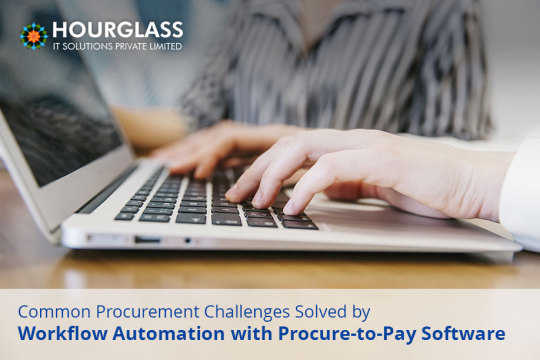#procurement automation software
Explore tagged Tumblr posts
Text
Elitemindz Procurement Management Software – Streamline Purchase Orders & Supplier Management

Discover how Elitemindz’s advanced Procurement Management Software helps businesses automate procurement processes, manage suppliers efficiently, and gain real-time spend insights for better cost control. Elitemindz’s software integrates easily with existing ERP systems and supports cloud deployment for flexibility and scalability. Boost your procurement workflow with this all-in-one digital procurement platform!
Call Now: 981151 0021
Read More:http://issuewire.com/elitemindz-launches-advanced-procurement-management-software-to-transform-business-procurement-processes-1836709220223182
#Procurement Management Software#Purchase order management software#Procurement process optimization#Procurement automation software
0 notes
Text
Top 5 benefit of procurement software management
Increased Efficiency:
Automation of repetitive tasks such as purchase order creation, supplier communication, and invoice processing leads to significant time savings.
Streamlined workflows reduce manual errors and delays, allowing procurement teams to focus on strategic tasks rather than administrative ones.
Centralized data storage and real-time tracking provide visibility into the procurement process, enabling faster decision-making and better resource allocation.
Cost Savings:
Negotiating better terms with suppliers and enforcing contract compliance become easier with procurement software, leading to cost reductions.
Improved spend visibility helps identify opportunities for cost optimization and eliminates unnecessary spending.
Automated approval workflows prevent maverick spending and ensure adherence to budgetary constraints.
Enhanced Supplier Management:
Procurement software enables better supplier selection through comprehensive supplier evaluation and performance monitoring.
Centralized supplier databases provide a holistic view of vendor relationships, facilitating strategic sourcing decisions.
Collaboration features foster stronger relationships with suppliers by facilitating communication, feedback, and resolution of issues in real-time.
Compliance and Risk Management:
Built-in regulatory compliance checks ensure adherence to legal requirements, industry standards, and internal policies.
Risk assessment tools help identify and mitigate potential supply chain disruptions, such as supplier bankruptcies or geopolitical issues.
Audit trails and documentation management capabilities aid in compliance reporting and reduce the risk of non-compliance penalties.
Data-driven Insights:
Procurement software generates actionable insights through advanced analytics and reporting capabilities.
Key performance indicators (KPIs) provide insights into procurement performance, supplier performance, and spending patterns.
Predictive analytics enable proactive decision-making by forecasting demand, identifying market trends, and optimizing inventory levels.
#procurement management software#Supply chain management software#Procure-to-pay software#Procurement automation software
0 notes
Text
Get Organized: ERPNext Distribution by Sigzen Makes It Easy
In today’s fast-paced Running a business can be tough, especially when things get messy. But what if there was a way to make it all simpler. That’s where ERPNext Distribution comes in. This awesome tool helps you manage your stuff like inventory, deliveries, and ordering without any hassle. It’s like having a helper for your business tasks. With ERPNext Distribution, you can say goodbye to…

View On WordPress
#Business Automation#ERP Integration#ERP Software Solutions#Inventory Management System#Procurement Management#Resource Planning#Stock Control#Workflow Optimization
3 notes
·
View notes
Text
Next-gen procurement platform Levelpath nabs $55M
Automated Wisdom Feed: Trending Astrology Predictions, Reiki Healing Tips & Tech News in English Levelpath, a procurement software startup founded by the duo behind Scout RFP, has raised $55 million in Series B funding led by Battery Ventures as the company looks to quadruple its revenue this year. The funding round also saw participation from existing investors, including Benchmark, which led…
#astrology#battery ventures#chakras#cosmic energy#coupa#digital wellness#energy healing#english content#feed aggregation#future tech#holistic living#horoscopes#Levelpath#meditation#mindfulness#procurement software#reiki#rss automation#self-improvement#Spirituality#tech news#vedic wisdom#wordpress plugins#yoga tech
0 notes
Text
#Automate Contract Extraction#contract lifecycle management software#contract management system#contract management software#contract management#contract management in procurement#contract lifecycle management
0 notes
Text
Why KOKA Books Is the Ideal Accounting Solution for Dairy Manufacturers

Dairy manufacturing involves much more than just processing milk. From tracking raw milk procurement and inventory to managing daily transactions, job work, wastage, and GST compliance, without automation, the risk of errors, delays, and inefficiencies increases significantly.
With solutions customized specifically for the dairy industry, Koka Books Accounting Software simplifies and streamlines every step of the process. Let’s explore why KOKA Books Is the Ideal Accounting Solution for Dairy Manufacturers
KOKA Books Accounting Software
Koka Books is built to handle the unique challenges of dairy businesses. From tracking milk procurement and managing inventory to recording job work and automating GST billing, it keeps your operations smooth and error-free. 1. Milk Procurement and Supplier Management
Dairy businesses often work with multiple milk suppliers and face daily rate changes. Koka Books simplifies this by allowing you to:
Record supplier-wise milk purchases
Apply variable rates based on quality (Fat/SNF)
Manage payments, advances, and outstanding balances
2. Inventory Management for Raw and Processed Goods
From raw milk and cultures to packed products like paneer, butter, and ghee; dairy inventory is complex. Koka Books allows:
Real-time tracking of stock
Batch-wise inventory management
Alerts for expiry-sensitive products
3. Production and Job Work Tracking
Whether you're processing in-house or outsourcing tasks like packaging, Koka Books lets you:
Create and manage job work orders
Track materials issued and finished goods received
Calculate production cost per batch
4. GST-Compliant Invoicing
Dairy businesses often work with mixed GST rates (e.g., on milk vs. processed products). Koka Books simplifies compliance by:
Generating GST-ready invoices instantly
Applying correct HSN codes and tax rates automatically
Exporting GSTR reports for easy filing
5. Sales and Distribution Insights
Stay on top of orders from distributors, retailers, and direct customers with tools like:
Route-wise and customer-wise billing
Daily sales report
Credit and payment tracking
6. Easy Reporting and Business Dashboard
Koka Books gives you real-time insights with:
Real-time profit and loss reports
Daily, monthly, and product-wise performance summaries
A dashboard to monitor cash flow, stock, and receivables
Conclusion:
For dairy manufacturers, accounting is about controlling cost, maximizing margins, and keeping operations smooth. Koka Books Accounting Software is designed with your industry in mind, offering the tools you need to manage procurement, production, billing, and compliance - all in one place.
If you're looking to simplify your accounting and scale your dairy business, Koka Books is the solution you've been waiting for.
#Dairy Accounting Software#Milk Procurement Management#Dairy Inventory Tracking#Dairy Business Automation#Koka Books Accounting#GST Software for Dairy#Accounting for Dairy Manufacturers#Job Work Tracking Dairy#Production Costing Software#Accounting Tools for Dairy Industry
0 notes
Text
Common Procurement Challenges Solved by Workflow Automation with Procure-to-Pay Software

Efficient procurement processes are the backbone of any successful organization. Yet, many businesses face persistent challenges that hinder productivity, increase costs, and disrupt operations. From delayed approvals to lack of transparency, these issues can snowball into larger operational inefficiencies. Thankfully, workflow automation, especially when integrated with robust Procure-to-Pay (P2P) software, provides a modern solution to these challenges. Let’s explore the common procurement pain points and how workflow automation effectively addresses them.
Read: https://www.hourglassit.com/blog/post/common-procurement-challenges-solved-by-workflow-automation-with-procure-to-pay-software
#procurement#procure to pay#procure to pay software#procure to pay process#procurement software#procurement management#procurement solutions#procurement process#business automation#software#technology#business
0 notes
Text
Streamlining Procurement with a Vendor Management System Firm in India
In the ongoing powerful business scene dealing with numerous merchants really is basic for guaranteeing smooth tasks and expanding productivity. For associations managing various providers, a vendor management system firm in India can be a unique advantage. These organizations give complete arrangements that assist organizations with smoothing out their acquisition processes, guaranteeing improved effectiveness and consistency.

A Vendor Management System (VMS) is a computerized device that permits associations to oversee merchant related data, track execution, and supervise the wholE procurement process from a solitary stage. In India, where organizations are progressively embracing computerized change, a vendor management system firm firm can assist associations with remaining cutthroat in the worldwide market.
The Role of Vendor Management Software in Modern Procurement
A vigorous vendor management software offers highlights like seller onboarding, execution observing, contract the executives, and chance moderation. It further develops provider connections as well as empowers organizations to go with information driven choices. Via mechanizing errands, for example, seller endorsement and receipt the executives, a VMS fundamentally diminishes the time and exertion required for manual cycles. This makes it a fundamental instrument for any e acquisition procedure.
E procurement, or electronic acquisition, is the method involved with buying labor and products through computerized implies. When incorporated with a vendor management system firm, E procurement turns out to be more productive, lessening blunders and further developing straightforwardness across the store network. Organizations in India, especially those with a huge provider base, benefit gigantically from consolidating E procurement arrangements with a dependable VMS. This guarantees that all merchant related processes are quicker as well as more precise.
Why Choose a Vendor Management System Firm in India?
India is home to a few imaginative vendor management system firm firms that proposition state of the art arrangements custom-made to the interesting necessities of organizations. These organizations give adjustable seller the executives programming that can coordinate consistently with existing venture asset arranging (ERP) frameworks. By cooperating with a trustworthy merchant the executives framework firm in India, organizations can work on their functional proficiency, diminish obtainment costs, and guarantee consistence with administrative norms.
Additionally, these organizations offer adaptable arrangements, permitting organizations, everything being equal, to profit from the most recent headways in vendor management software. Whether you are a private company or a huge endeavor, putting resources into a VMS can give long haul reserve funds and upgraded seller connections.
Conclusion
As organizations keep on developing, utilizing a vendor management system firm firm in India is fundamental for remaining cutthroat. A very much executed Vendor Management System can changE procurement processes, making them more productive and straightforward. By consolidating E procurement rehearses with a complete vendor management software, associations can smooth out their tasks and boost their seller connections, setting the establishment for future achievement.
#contract lifecycle management#vendor management system firm in india#e procurement#vendor management system#vendor management software#spend management#supplier onboarding automation
0 notes
Text
How Procurement Transformation is Revolutionizing Business Operations | ProcurEngine

Discover how Procurement Transformation can streamline your organization's purchasing process and drive efficiency. At ProcurEngine, we specialize in implementing cutting-edge Procurement Software solutions that enable better visibility and control over procurement activities. Our expert team offers insights into digital procurement trends, helping businesses stay competitive in a rapidly evolving market. Learn more about automated procurement tools and how they can save costs and enhance operational performance. Visit our latest blog on spearheading procurement transformation for detailed insights.
#Procurement transformation#Spearheading Procurement Transformation#procurement software#automated procurement
0 notes
Text
Maximizing Workforce Efficiency: How VMS Platforms Empower Direct Sourcing

One of the most significant developments in this space is the rise of Vendor Management Systems (VMS), which enable organizations to streamline the management of their contingent workforce. Paired with the growing trend of Direct Sourcing, VMS platforms are revolutionizing how businesses acquire and manage talent.
Understanding Vendor Management Systems (VMS)
A VMS platform is a software solution designed to manage all aspects of an organization’s contingent workforce, from vendor relationships to temporary staff hiring, performance tracking, and payment. It allows companies to centralize and automate processes that were traditionally handled manually or through various disparate systems. The benefits of a VMS platform include better visibility, improved cost control, enhanced compliance, and faster onboarding for contract workers.
The core function of a VMS is to manage third-party staffing vendors, but its utility has expanded as workforce management becomes more sophisticated. A modern VMS platform now also supports Direct Source strategies, enabling companies to build their own talent pools and reduce dependence on external staffing agencies.
Direct Sourcing: A Growing Trend
Direct Sourcing refers to the practice of directly hiring contingent workers from a company’s existing network or talent pool, rather than through external staffing vendors. This approach allows businesses to tap into a pre-vetted group of freelancers, contractors, and temporary workers without incurring the additional costs and markups associated with staffing agencies.
The benefits of Direct Sourcing are clear:
Cost Savings: By cutting out the middleman, companies can save on recruitment fees and vendor markups.
Faster Hiring: Companies with established talent pools can quickly access qualified candidates, reducing the time-to-hire.
Better Quality Control: Organizations have more control over the recruitment process and can ensure that they are hiring workers who align with their specific needs and culture.
How a VMS Platform Enhances Direct Sourcing
While Direct Sourcing provides significant advantages, it requires a strategic and organized approach to managing talent. This is where VMS platforms come in. By integrating Direct Sourcing capabilities into their VMS, companies can optimize the recruitment and management of contingent workers. Here’s how:
Building and Managing Talent Pools: VMS platforms allow companies to create and maintain internal talent pools, consisting of previous contractors, freelancers, and referrals. These workers are often already familiar with the company’s processes and culture, making them ideal candidates for future projects.
Seamless Integration with Workforce Management: A modern VMS platform integrates with HR, procurement, and finance systems, creating a seamless experience for hiring and managing contingent workers.
Automated Workflows: A key advantage of a VMS platform is the automation of recruitment workflows.
Compliance and Risk Management: Hiring contingent workers, particularly across multiple jurisdictions, introduces a range of legal and compliance risks.
Data-Driven Decision Making: VMS platforms provide real-time analytics and reporting, giving companies valuable insights into their contingent workforce.
The Future of VMS and Direct Sourcing
As the contingent workforce continues to grow, the combination of Vendor Management System platforms and Direct Sourcing will become even more integral to workforce management strategies. Emerging technologies such as Artificial Intelligence (AI) and Machine Learning (ML) will further enhance VMS capabilities, enabling predictive workforce planning, talent matching, and real-time decision-making.
Conclusion
The integration of VMS platforms and Direct Sourcing is transforming how businesses manage their contingent workforce. By centralizing and automating key processes, VMS platforms empower organizations to take control of their talent acquisition strategies, reducing costs, improving efficiency, and ensuring compliance. As Direct Sourcing continues to gain popularity, businesses that effectively leverage their VMS will be well-positioned to stay competitive and responsive to changing market demands. The future of workforce management is one where agility and efficiency go hand in hand, and VMS platforms are at the heart of this transformation.
[REVEALED]: 7 Questions You Must Ask In 2024 Before Investing in a VMS
Top 6 Reasons Why You Should Absolutely Invest in a VMS
What is the Importance of Credentialing in Healthcare?
#b2bmarketing#b2b services#business#hr software#success#vms#vendors#technology#directsourcing#recruiting solutions#compliance#talentacquisition#contractors#applicant tracking system#management#workforce#contractmanagement#vendor company#best vendor replica yupoo#automation#usa#hr solutions#vendor management solutions#vendor management software#contingentworkforce#vendor management tools#vendormanagement#procurement#ai#job interview
0 notes
Text
Sysaler's Reverse Auction Software
Sysaler Auction software is designed to simplify procurement-related processes- B2B space, both for buyers and sellers Turn your procurement process into a savings generator and efficiency driver with sysaler procurement software To know more about e-auction related services, visit our website: https://www.sysaler.com

#sysaler#eauction#procurement#enegotiations#cloudbasedsolutions#cloudbasedsoftware#procurementprocess#businesssupport#b2b#auction#B2BSoftware#ForwardAuction#eprocurementprocess#e_sourcing#sourcetopay#automation#software#supplychain#smallbusiness#technology#quality#sourcing#ProcurementTips
0 notes
Text
Streamlining Design to Delivery: Why ERP Solutions for Engineering Industries Matter
In today’s highly competitive engineering sector, staying ahead means delivering high-quality products on time while keeping costs under control. From initial design and procurement to production and final delivery, the entire process involves multiple stakeholders, complex workflows, and stringent quality checks. This is where ERP solutions for engineering industries play a pivotal role.

With advanced ERP software for engineering companies in India, businesses can integrate and streamline every aspect of their operations, enhancing productivity, reducing errors, and ensuring seamless collaboration. Let’s explore why implementing engineering ERP software solutions has become essential for modern engineering firms and how it revolutionizes the journey from design to delivery.
Challenges in the Engineering Industry
Engineering companies often deal with complex project lifecycles. Managing multiple departments—such as design, production, procurement, and sales—requires meticulous coordination. Some common challenges include:
Disjointed workflows: When departments operate in silos, it leads to communication gaps and delays.
Resource management issues: Manual tracking of inventory, manpower, and materials often causes inefficiencies.
Project delays: Lack of real-time project visibility increases the risk of missed deadlines.
Data inconsistency: Multiple systems lead to duplicate or incorrect data entries.
Cost overruns: Inadequate planning and tracking lead to budget deviations.
To overcome these challenges, many engineering firms are partnering with leading ERP software providers in India to implement robust ERP systems tailored to their needs.
What Is ERP for Engineering Companies?
ERP software for engineering companies is a comprehensive solution that integrates core business processes like design management, production planning, supply chain, project management, quality control, finance, and human resources into a single unified platform.
Unlike generic ERP systems, a dedicated engineering ERP software solution caters to the unique needs of engineering businesses by focusing on:
Project-based workflows
Bill of Materials (BOM) management
Resource scheduling and allocation
CAD integration for design workflows
Document management for drawings and technical data
Real-time tracking of project progress
By connecting every aspect of the engineering lifecycle, ERP ensures improved collaboration, better decision-making, and enhanced customer satisfaction.
Why ERP Solutions for Engineering Industries Matter
The engineering industry is evolving rapidly, with increasing customer expectations, stringent regulatory requirements, and global competition. Here’s why ERP solutions for engineering industries are critical:
1. Streamlined Project Management
Engineering projects often involve multiple stages, from design conceptualization to final delivery. ERP software for engineering companies provides a centralized platform to plan, monitor, and manage projects efficiently. Project managers can view timelines, allocate resources, track milestones, and ensure on-time delivery.
2. Improved Resource Utilization
Engineering projects require precise allocation of raw materials, machinery, and manpower. ERP automates resource planning, ensuring optimal utilization while minimizing wastage. This not only reduces operational costs but also boosts profitability.
3. Real-Time Data Access
One of the biggest advantages of partnering with an Engineering ERP Software Company in India is gaining access to real-time data. Stakeholders can view updated information on inventory, project progress, procurement status, and financials, enabling faster and more accurate decision-making.
4. Enhanced Collaboration Between Teams
Design, production, and procurement teams can work seamlessly through an integrated ERP platform. For instance, changes in design automatically update the BOM, procurement schedules, and production plans, eliminating miscommunication and delays.
5. Quality Assurance and Compliance
Engineering industries must adhere to strict quality standards. ERP systems help maintain quality checkpoints at every stage, ensuring compliance with industry norms and reducing the chances of rework or product recalls.
6. Cost Control and Budgeting
ERP software providers in India design systems that allow engineering companies to monitor project costs in real-time. By comparing actual expenses with budgeted values, companies can avoid cost overruns and improve financial planning.
Benefits of ERP Software for Engineering Companies in India
The engineering industry in India is booming, thanks to rapid industrialization and infrastructure development. However, this growth also brings challenges such as tight project deadlines, rising material costs, and a shortage of skilled manpower. Implementing ERP software for engineering companies in India offers numerous benefits:
Localized solutions: Indian ERP software companies in India provide solutions tailored to regional compliance, taxation, and reporting needs.
Scalability: As your business grows, ERP systems can easily adapt to handle larger volumes and more complex projects.
Cost-effectiveness: Indian ERP providers offer affordable solutions without compromising on quality or functionality.
Better vendor and client management: Engineering ERP systems streamline vendor relationships, improve procurement efficiency, and enhance client satisfaction.
Choosing the Right Engineering ERP Software Solution
Not all ERP systems are the same. When selecting an engineering ERP software solution, it’s important to consider the following factors:
Industry-specific features – Look for modules that support BOM management, CAD integration, project scheduling, and quality control.
Customization flexibility – Every engineering company has unique workflows. Your ERP should be customizable to fit your processes.
User-friendly interface – The easier it is for your team to adopt the software, the faster you’ll see results.
Integration capabilities – Ensure the ERP can integrate with existing tools like CAD software, CRM, and accounting systems.
Support and training – Partner with a reliable Engineering ERP Software Company in India that offers robust after-sales support and training.
Why Choose Indian ERP Software Providers?
India is home to some of the most innovative ERP software companies in India. These companies understand the unique challenges faced by local engineering businesses and provide cost-effective, scalable, and future-ready solutions. Moreover, working with an Indian ERP provider ensures faster implementation, better support, and compliance with Indian taxation and regulatory norms.
STERP: Your Trusted Partner for Engineering ERP
Shantitechnology (STERP) is one of the leading ERP software providers in India, specializing in engineering-specific ERP solutions. With years of expertise, STERP delivers cutting-edge software that integrates design, procurement, production, and delivery, ensuring end-to-end efficiency.
Our engineering ERP software solutions are designed to:
Reduce project delays and cost overruns
Improve collaboration between departments
Enhance resource utilization and inventory management
Streamline workflows from design to delivery
Whether you are a small-scale engineering firm or a large enterprise, STERP provides customized ERP solutions to meet your exact needs.
Final Thoughts
In the engineering industry, success depends on how efficiently you can move from design to delivery without compromising quality or profitability. Implementing ERP solutions for engineering industries is no longer a luxury but a necessity. By choosing a trusted Engineering ERP Software Company in India like STERP, you can automate processes, gain real-time insights, and stay ahead of the competition.
If you are looking for reliable ERP software for engineering companies in India, STERP is here to help you transform your business.
Ready to streamline your engineering operations? Contact STERP today and discover how our ERP solutions can revolutionize your workflow from design to delivery!
#ERP software for engineering companies in India#Engineering ERP software company in India#ERP software for engineering companies#ERP solutions for engineering industries#Engineering ERP software solution
3 notes
·
View notes
Text
ERP in Textile Manufacturing: Challenges and Solutions

The textile manufacturing industry is a complex, fast-paced sector that requires real-time coordination between inventory, production, sales, procurement, and compliance departments. To stay competitive and efficient, more and more textile businesses are turning to ERP software in Ahmedabad. Yet, implementing an ERP solution in textile manufacturing isn’t without its challenges. This blog explores the key hurdles textile manufacturers face and how leading ERP software companies in Ahmedabad are helping overcome them.
Challenges in Textile Manufacturing
Complex Production Cycles Textile manufacturing involves multi-stage production processes such as spinning, dyeing, weaving, and finishing. Managing these stages manually or through outdated systems often leads to inefficiencies, production delays, and quality issues.
Inventory Management With diverse raw materials like cotton, wool, synthetics, and dyes, inventory tracking becomes a major challenge. Overstocking or stockouts can severely affect cost and production timelines.
Quality Control Consistency in product quality is crucial in textiles. Manual tracking of quality inspections increases the chances of errors and non-compliance with customer requirements or international standards.
Data Silos and Lack of Integration Different departments often use separate systems for finance, HR, production, and sales. This fragmentation results in data silos, making it difficult to get real-time business insights.
Regulatory Compliance From environmental standards to labor laws, textile businesses must comply with a host of regulations. Non-compliance can result in penalties and reputation loss.
How ERP Solves These Challenges
1. Centralized Process Management
Modern ERP for manufacturing companies in Ahmedabad offers integrated modules that connect every department—from production to dispatch. This centralization ensures that information flows freely across the organization, improving coordination and decision-making.
2. Real-Time Inventory Tracking
Manufacturing ERP software in Ahmedabad comes with real-time inventory tracking and automated reordering systems. This ensures optimal stock levels, minimizes wastage, and improves order fulfillment rates.
3. Automated Quality Checks
ERP systems can be configured to trigger quality checks at each production stage. By automating this process, textile manufacturers can maintain consistency and meet customer expectations effortlessly.
4. Custom Workflows and Reporting
With customizable dashboards and reporting tools, ERP software enables managers to generate insights and stay ahead of bottlenecks. Whether it’s machine downtime or delayed procurement, ERP helps identify issues quickly.
5. Compliance and Documentation
ERP solution providers in Ahmedabad often include compliance tracking modules that ensure your operations meet local and international textile standards, helping you avoid penalties and build trust.
Why Choose Local ERP Providers?
Choosing a local ERP software company in Ahmedabad has its benefits:
Tailored Solutions: Local providers understand the unique requirements of the Indian textile sector.
Faster Support: On-ground teams ensure quicker implementation and ongoing support.
Cost-Effective: Eliminates foreign exchange costs and enables customized pricing.
Several ERP software providers in Ahmedabad specialize in textile manufacturing, offering scalable, cloud-based, and industry-specific solutions that grow with your business.
Final Thoughts
ERP implementation in textile manufacturing isn’t just a digital upgrade—it’s a strategic decision that enhances productivity, reduces cost, and ensures compliance. While challenges exist, the right ERP partner can turn these into opportunities. If you're looking for the best ERP software companies in Ahmedabad, ensure they offer specialized experience in textile manufacturing and a proven implementation track record.
Whether you're a mid-sized unit or a large-scale enterprise, investing in a robust ERP system through trusted ERP solution providers in Ahmedabad could be the transformation your textile business needs.
3 notes
·
View notes
Text
The UN special rapporteur on human rights in the occupied Palestinian territories has called for sanctions and an arms embargo on Israel and for global corporations to be held accountable for “profiting from genocide” in Gaza.
A report by Francesca Albanese to the UN Human Rights Council on Thursday points to the deep involvement of companies from around the world in supporting Israel during its 21-month onslaught in Gaza.
“While life in Gaza is being obliterated and the West Bank is under escalating assault, this report shows why Israel’s genocide continues: because it is lucrative for many,” the report says.
Special rapporteurs are independent human rights experts appointed to advise or report on specific situations. Albanese, an Italian legal scholar who has been the special rapporteur on the occupied Palestinian territories since 2022, first referred to the Israeli offensive in Gaza as a genocide in January 2024.
The international court of justice (ICJ) is weighing the charge of genocide against Israel but Albanese has argued that the evidence of genocide is overwhelming and pointed out that the court issued preliminary measures last year recognising the possibility of genocide in Gaza, triggering universal responsibility to prevent it.
Israel has largely ignored the ICJ’s calls on it to take steps to mitigate the toll on Palestinian civilians and disputed the court’s jurisdiction.
The special rapporteur’s report is titled “From economy of occupation to economy of genocide” and looks at international corporate involvement in supplying weapons and supplying heavy machinery used to raze Palestinian neighbourhoods in Gaza and the West Bank, agricultural companies selling produce from illegal settlements, and investment firms helping fund the war.
“While political leaders and governments shirk their obligations, far too many corporate entities have profited from Israel’s economy of illegal occupation, apartheid and, now, genocide,” the report says.
The report says the Israeli military has benefited from “the largest ever defence procurement programme” for the F-35 fighter jet, made by Lockheed Martin with the involvement of more than 1,600 other manufacturers and eight states. It says Israel was the first to fly the warplane in “beast mode”, carrying 18,000lb of bombs at a time.
The US technology firm Palantir comes under particular criticism in the Albanese report for its close partnership with the Israel Defense Forces (IDF), with which the company agreed a strategic partnership for Palantir to assist its “war-related missions”.
Palantir, whose software allows automated decision-making on the battlefield, has denied any involvement in the IDF’s Lavender or Gospel programmes for identifying targets in Gaza.
The Albanese report also criticises heavy equipment manufacturers such as Caterpillar and Volvo for allegedly supplying heavy machinery used in mass demolitions of homes, mosques and infrastructure in Gaza and the West Bank.
“These companies have continued supplying the Israeli market despite abundant evidence of Israel’s criminal use of this machinery and repeated calls from human rights groups to sever ties,” Albanese says in the report. “Passive suppliers become deliberate contributors to a system of displacement.”
The report notes that Israel has helped pay for the war and consequent deep budget deficits by selling treasury bonds. By buying them, the report argues, international finance has helped keep the war going.
“Some of the world’s largest banks, including BNP Paribas and Barclays, stepped in to boost market confidence by underwriting these international and domestic treasury bonds, allowing Israel to contain the interest rate premium, despite a credit downgrade,” it says.
It names asset management firms including Pimco (owned by the German-based financial services company Allianz) and Vanguard as major buyers of Israeli treasury bonds.
The report also points to the Norwegian Government Pension Fund Global (GPFG), the world’s largest sovereign wealth fund, for having increased its investment in Israeli companies by 32% since October 2023.
On Monday, Norway’s biggest pension fund, KLP, announced it would no longer do business with two companies – the Oshkosh Corporation in the US and ThyssenKrupp in Germany – because they sell equipment to the Israeli military that could be being used in Gaza. Neither company is named in the UN report.
Albanese’s report points to precedents in holding corporations legally accountable for human rights abuses they enable, including the prosecution of leading German industrialists at the Nuremberg tribunal after the second world war, in what was known as the IG Farben trial.
Another example cited is the South African truth and reconciliation commission, which took the country’s big companies to task for their involvement in apartheid.
The UN published its own benchmarks in 2011, in its guiding principles on business and human rights, which said corporations had a responsibility to do due diligence to ensure they were not infringing human rights and to take steps to address harmful effects of their business.
In her recommendations, Albanese calls for sanctions and an arms embargo on Israel, and urges the international criminal court “and national judiciaries to investigate and prosecute corporate executives and/or corporate entities for their part in the commission of international crimes and laundering of the proceeds from those crimes”.
#excerpts#sanctions#arms embargo#united nations#gaza#bds#catepillar#volvo#lockheed martin#barclays#palantir#bnp paribas#pimco#vanguard#gpfg
2 notes
·
View notes
Text
#non profit contract management#contract automation#contract management system#contract management software#contract management in procurement#contract lifecycle management software#contract lifecycle management
0 notes
Text
Building Materials ERP Solutions in Dubai: A Complete Guide
Dubai's construction industry is booming, with large-scale infrastructure projects, real estate developments, and commercial constructions driving demand for high-quality building materials. Managing procurement, inventory, supply chain, and financial transactions efficiently is essential for businesses in this sector. ERP solutions for building materials provide an integrated platform that streamlines business operations, reduces errors, and enhances productivity. Cubix IT Solution, a leading provider of ERP software in Dubai, offers customized solutions designed to meet the specific needs of building materials suppliers, manufacturers, and distributors. In this blog, we’ll explore the importance, benefits, types, and relevance of ERP solutions for the building materials industry in Dubai.
Why ERP Software is Crucial for the Building Materials Industry
The building materials sector in Dubai is highly competitive, requiring businesses to handle complex supply chains, bulk orders, and fluctuating material costs. Without an efficient system, companies face challenges like inventory mismanagement, delivery delays, and inaccurate financial reporting. A specialized building materials ERP solution helps businesses automate workflows, track real-time stock levels, and streamline procurement and sales processes.
With Dubai being a global hub for construction, businesses must also comply with local and international trade regulations. A cloud-based or on-premise ERP system ensures seamless compliance, reducing risks and ensuring smooth operations. Companies like Cubix IT Solution provide industry-specific ERP solutions for building materials businesses, allowing them to handle everything from supplier coordination to project-based accounting with ease.
Key Benefits of Building Materials ERP Solutions
Real-Time Inventory Management: The construction industry requires a vast range of materials like cement, steel, wood, and tiles. An ERP system helps businesses track inventory, avoid shortages, and optimize stock levels.
Automated Procurement & Supply Chain Management: Businesses can automate purchase orders, vendor management, and logistics coordination, ensuring timely delivery of materials.
Project-Based Accounting & Financial Management: ERP software offers cost tracking, invoicing, and financial reporting, ensuring accurate budgeting and profitability analysis.
Sales & Customer Relationship Management (CRM): An integrated CRM module helps manage client relationships, track sales, and improve customer service.
Regulatory Compliance & Document Management: With Dubai’s strict building regulations, an ERP solution helps businesses manage certifications, permits, and compliance records effortlessly.
Business Intelligence & Analytics: Real-time reporting and analytics provide insights into market trends, helping businesses make data-driven decisions.
Types of ERP Software for the Building Materials Industry
There are different types of ERP solutions available based on the business size, operational complexity, and industry requirements:
Cloud-Based ERP: Ideal for small and medium-sized enterprises, cloud ERP solutions offer flexibility, scalability, and remote access without high infrastructure costs.
On-Premise ERP: Large enterprises with complex operations may opt for an on-premise ERP system, which provides greater control over business data and security.
Hybrid ERP: A mix of cloud and on-premise ERP, allowing businesses to customize their ERP deployment as per operational needs.
Industry-Specific ERP: Custom ERP solutions tailored for building materials suppliers include specialized features like bulk order management, raw material tracking, and supplier coordination.
Relevance of ERP Solutions for Dubai’s Building Materials Industry
Dubai's construction market is one of the most dynamic in the world, with billions of dollars invested in real estate and infrastructure projects. The demand for efficient ERP software is higher than ever, as companies look to optimize their supply chains and reduce operational costs. Building materials ERP solutions help businesses handle bulk transactions, manage warehouses, and ensure timely delivery of materials to construction sites.
Moreover, the integration of artificial intelligence (AI), machine learning (ML), and IoT in modern ERP systems is enhancing efficiency and predictive analytics. Companies like Cubix IT Solution offer cutting-edge ERP solutions that help building materials businesses stay ahead of competitors and meet industry demands seamlessly.
Conclusion
Investing in an ERP solution for the building materials industry is essential for businesses in Dubai to achieve operational efficiency, reduce costs, and improve productivity. From inventory management and supply chain automation to financial tracking and regulatory compliance, ERP software streamlines all critical business functions. Companies like Cubix IT Solution provide custom ERP solutions tailored for building materials manufacturers, distributors, and suppliers, ensuring long-term success in a competitive market.
Whether you are a small supplier or a large-scale distributor, implementing the right ERP solution can help you scale operations, improve profitability, and enhance customer satisfaction. As Dubai continues to lead in construction and real estate development, businesses that adopt ERP technology will have a significant competitive advantage in managing their operations efficiently.
2 notes
·
View notes